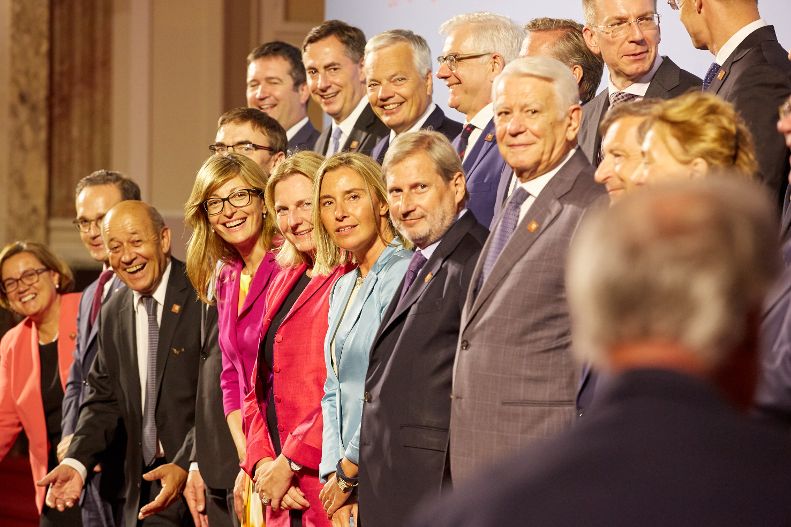
Informal meeting of EU foreign affairs ministers (“Gymnich”)
On 30 and 31 August, the EU foreign affairs ministers, upon joint invitation by Austrian Federal Minister for Europe, Integration and Foreign Affairs, Karin Kneissl, and the High Representative and Vice President of the European Commission, Federica Mogherini, came to Vienna for an informal meeting, also known as the Gymnich Meeting, at the Hofburg Palace.
Federal Minister Kneissl said after the meeting, “It was a pleasure to welcome colleagues from the EU and candidate countries to Vienna and to host fruitful discussions in the Hofburg Palace. Our talks took place in an excellent atmosphere.”
These informal meetings take place twice a year and are hosted by the country holding the rotating presidency of the Council of the European Union. They offer the possibility to discuss important issues in an informal manner. Contrary to the meetings of the Council of the European Union, there is neither a set agenda nor an official outcome document. The High Representative and Vice President of the European Commission, Federica Mogherini, in agreement with the country currently holding the rotating presidency, determines the points to be discussed and chairs the meeting.
European Commissioner Johannes Hahn and David McAllister, Member of the European Parliament and President of the Committee on Foreign Affairs of the European Parliament, also participated in the meeting in Vienna.
The meeting was opened with a discussion on current developments in the Middle East, during which in particular the situation in Syria and Iran were addressed. During the working session on transatlantic relations, ministers discussed the general state of relations and perspectives for the future. Discussions about South-East Europe centred around developments in the coming months, with a focus on enlargement.
The working session on effective multilateralism took place together with the EU partner countries Albania, the former Yugoslav Republic of Macedonia, Montenegro, Serbia and Turkey. Strengthening effective multilateralism and a rules‑based global order is one of the key priorities of the EU Global Strategy – the EU’s fundamental strategy document for its Common Foreign and Security Policy. At the same time, it is one of the priorities of the Austrian Presidency of the Council of the European Union.
After the meeting, Federal Minister Karin Kneissl said, “Multilateralism and a rules-based global order can only be strengthened on the basis of the principle of ‘pacta sunt servanda’. We have to be able to trust that international treaties and agreements will be adhered to.”
The meeting of the EU foreign affairs ministers ended at midday on Friday 31 August with a joint press conference by Federal Minister Karin Kneissl and the High Representative and Vice President of the European Commission, Federica Mogherini.
More information about the event can be found on the event page.
Federal Ministry for Europe, Integration and Foreign Affairs
Department for Press and Information
+43 50 11 50 3320
abti3@bmeia.gv.at